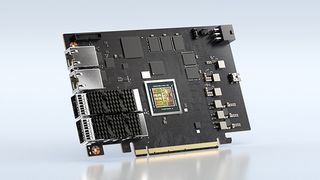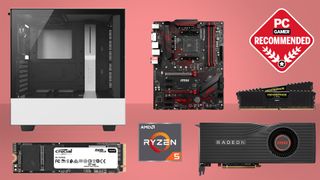The AI tasked with keeping the metaverse safe comes with a lot of GPU firepower
AI-powered servers with Nvidia GPUs will give potential metaverse hackers a few things to think about.

At yesterday's VMware Explore 2022 conference in San Francisco, server giant VMWare announced the vSphere 8—a metaverse-ready data center platform with artificially intelligent security.
vSphere 8 combines recent Dell PowerEdge solutions, Nvidia BlueField-2 data processing units (or DPUs), and super high-end Nvidia server GPUs. All that tech is packaged together under the watchful eye of some boss-grade AI enterprise software known as NSX Intelligence, ZDnet reports.
In an age where cyberattacks are growing in scale and voracity, VMware has focused on security for the project, employing AI to stand at the firewall gates and uphold some serious, zero-trust policies. We can imagine a bunch of glowy blue Tron guys lined up to do battle against invaders with their little discs, but what does AI security actually mean?
"With this package, we are protecting workloads with next-generation firewalls. Now you will see firewalls in every single server. So we are no longer confined to how previous data centers were built," says VMware's vice-president of security engineering, Brad Doctor.
Switching from the conventional singular, external firewall solution to having VMware's NSX firewall (PDF warning) on every server will mean better security across the board. As Nvidia's Head of computing, Manuvir Das notes, isolation is the name of the game here.
"Security has always been a focus of VMware NSX platform, and now hosting that on the Bluefield gives us a new layer of isolation between the application processing domain and the infrastructure processing domain."
Essentially, it'll be easier to enable intrusion detection and protection to keep the server safe, and in turn the metaverse, as we move into an increasingly digital age.
PC Gamer Newsletter
Sign up to get the best content of the week, and great gaming deals, as picked by the editors.
"Security has always been a focus of VMware NSX platform, and now hosting that on the Bluefield gives us a new layer of isolation between the application processing domain and the infrastructure processing domain."
Essentially, it'll be easier to enable intrusion detection and protection to keep the server safe, and in turn the metaverse, as we move into an increasingly digital age.

Best CPU for gaming: The top chips from Intel and AMD
Best gaming motherboard: The right boards
Best graphics card: Your perfect pixel-pusher awaits
Best SSD for gaming: Get into the game ahead of the rest
The AI can even go as far as recognising when a password is being typed in too slowly—an indicator of the presence of a potential hacker. We all know AI doesn't always know best, though, and someone's sure to get a shock being locked out after logging in one henpecked letter at a time.
On a more serious note: AMD, Dell, HPE, Intel, Nvidia and Lenovo have all given statements in support vSphere 8, with Nvidia's Das noting that “AI and zero-trust security are pushing the boundaries of computing and networking for enterprise data centers."
So comes another step in the process of making the world more AI-centric. Let's hope when the machines turn, our meatbag metaverse owners don't automatically get locked out for being human.
I'm sorry, Zuck. I'm afraid I can't do that.

Screw sports, Katie would rather watch Intel, AMD and Nvidia go at it. Having been obsessed with computers and graphics for three long decades, she took Game Art and Design up to Masters level at uni, and has been demystifying tech and science—rather sarcastically—for three years since. She can be found admiring AI advancements, scrambling for scintillating Raspberry Pi projects, preaching cybersecurity awareness, sighing over semiconductors, and gawping at the latest GPU upgrades. She's been heading the PCG Steam Deck content hike, while waiting patiently for her chance to upload her consciousness into the cloud.
Most Popular





